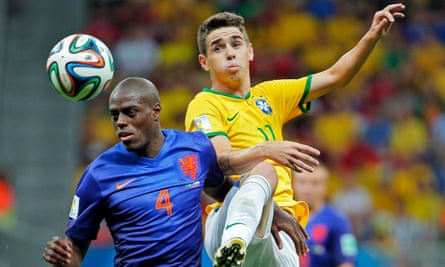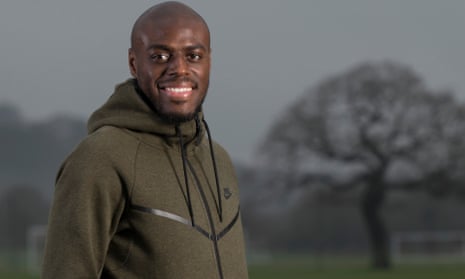Ask fans of Stoke City who has been the Premier League signing of the season and many will nominate Bruno Martins Indi. The centre-back has become so commanding at the heart of Stoke’s defence, and so popular among supporters who see similarities with their much-loved former captain Abdoulaye Faye, that one of the best pieces of business the club could do during the January transfer window would be to make his loan move from Porto permanent. Stoke are trying to do just that.
Wholehearted and reliable on the pitch and, as becomes clear during this interview, ebullient and thoughtful off it, his presence has been a big plus for Stoke, for whom he has played every minute of every match since his debut in September. Judging by his performances in England it seems hard to believe that anyone can have been annoyed enough by Martins Indi to snub him for more than a year, yet that is what the Holland manager, Danny Blind, did after the player was sent off in the manager’s first competitive match, in September 2015. It was a pernickety dismissal, not unlike David Beckham’s infamous one for England against Argentina, as Martins Indi flicked out a forearm in reaction to being fouled by Iceland’s Kolbeinn Sigthorsson but, after Holland went on to lose 1-0, Blind publicly castigated the defender and so did some of his team-mates, with Arjen Robben calling him “stupid”. Martins Indi was 23 and was left out for the rest of a qualifying campaign during which Holland never improved, but he still bore a disproportionate share of the blame for the failure to reach Euro 2016.
“It’s very difficult for a young player to bounce back in such a situation,” reflects Martins Indi. “Of course I was not happy with it but people can give their opinions. It was a very strange moment in my career, watching Holland as a supporter when I used to be always there playing. For a long time, like a year, I didn’t talk about it and didn’t do any interviews. I just stepped back and analysed it. That was good for me because it let me build up my strength. Also Julen Lopetegui, who was my club manager at Porto and is now the head coach of Spain, was a big support to me. He relieved a lot of the pressure on me and even took me out of some games but kept saying: ‘Stay prepared, you’ll be back.’ I learned a lot about personality from him. I still talk to him a lot now.”

Martins Indi eventually had a discussion with Blind, too, and, following strong performances for Stoke, was recalled in November for a friendly against Belgium, although he remained on the bench. “We had a good chat and now everything is normal, there are no hard feelings, even with Robben. I’m just doing my thing.”
Blind’s attitude was, perhaps, the flipside to the one that many managers, including Ronald Koeman, Louis van Gaal and now Mark Hughes, have had towards Martins Indi. All have been willing to assign him heavy responsibility. He was coached by Koeman at Feyenoord, for whom he made his debut at 18, and by Van Gaal with Holland, for whom he made his first appearance at 20 before becoming a stalwart of the side that finished third at the 2014 World Cup.
“I had the luxury of training under Koeman and Van Gaal and I’m very happy about that,” he says. “They gave me a lot of responsibility at a young age. Leading the backline, building up from the back, normally managers don’t like to put so much responsibility on a young player so quickly.” Van Gaal became so enamoured with the player that he declared after one of his first internationals: “I love you already!” Martins Indi shares the affection. “We had a great time, even before the World Cup. For the whole journey there we were like a real family.”
But Martins Indi has another family, of course, which is why the rumours of a move to Manchester United during Van Gaal’s reign never turned into reality. “I don’t know about a move to Manchester; he knew that I wanted to go to Porto so he let me go my way as he went his,” says Martins Indi, who has always had an attachment to Portugal, having been born there to parents from Guinea‑Bissau before moving to Rotterdam when he was three months old. “When I’m not playing for Holland I support Portugal for sure – it’s natural. I was there when they won Euro 2016.”
He did not stay there much longer, however, because Porto’s new manager, Nuno Espírito Santo, revealed that Martins Indi was not part of his plan. So the player had to choose a new club and plumped for one with a manager he could trust. “I had a few options but chose Stoke because the manager had a good view of playing and he had previously managed some guys that have the same agent as me and were very successful with him, such as Nigel de Jong at Manchester City. My agent knew how he works and he said I can learn from him, he likes to play. And I wanted to challenge myself.”
He has relished the extent to which the Premier League has challenged him. “Every team has a different style here,” he explains. “In Holland you know that everybody wants to build up. When you play with a big club in Portugal you know that the opposition are going to defend and try to counterattack. But here one week you go against teams that build up and another you go against, for example, teams who play for the second balls. Every game is different, and even within games teams can switch.”
He picks October’s match against Manchester United at Old Trafford as his favourite. That 1-1 draw lifted Stoke off the bottom of the table and got their campaign going in earnest. The next week they got their first league win of the season, against Sunderland, and, as they prepare to face United at home on Saturday, they are ninth. “I lived that moment very intensely,” he says of October’s match. “Not just because we made history by getting a point at Old Trafford for the first time in the Premier League era but because [before that] we were in a situation where Stoke was defending badly and every shot at goal was going in. We had gone six league games without winning. That can affect your confidence.
“But I’ve learned that you always have to see positive things even when things aren’t going your way. Things will eventually come good and in that game it eventually came. That was the key for the season.”
Stoke have finished ninth in each of the past three seasons but they go into the game against United looking up. “Seventh is a good target,” says Martins Indi. But next season will he still be at Stoke? The club have an option to buy him from Porto in the summer for around £8.5m but want to complete a transfer before then lest his performances convince other clubs to explore ways of gazumping them. The player says he is happy at Stoke but admits he is “not fully integrated into the country yet” mainly because he misses living by the sea. Talks continue. “It doesn’t depend on me,” he says. “I cannot say more than that. You need three parties. I know what I’m doing, the club knows what they are doing, I just keep playing football. That’s what I like and we’ll see what the future will bring.”

Comments (…)
Sign in or create your Guardian account to join the discussion